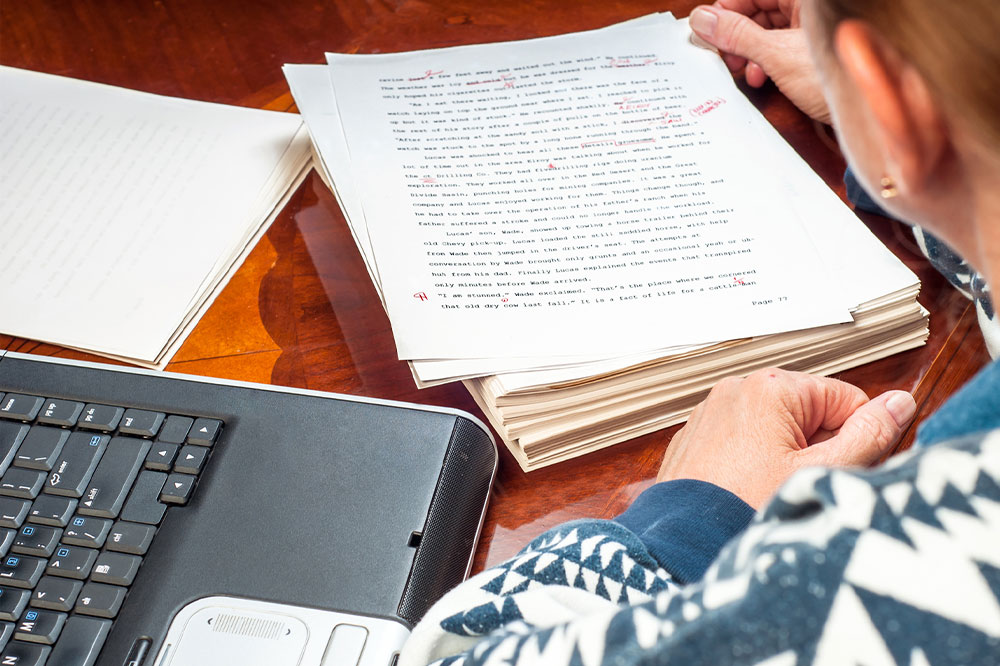Key Responsibilities of Book Editors and Proofreaders
New and experienced writers both could do with some help when it comes to getting their work ready to be published. Here, the role of a book editor is invaluable. A skilled editor is more than just a proofreader, they are your trusted partner in helping you create an error-free manuscript. From refining your writing style to ensuring grammatical accuracy, an editor brings polishes a book to make it more reader-friendly.
Responsibilities of an editor
Here is what book editors are supposed to do:
Offer objective perspective: One of the primary reasons to engage the services of a book editor is their ability to offer an objective perspective on your work.

Enhance writing style: A skilled book editor is well-versed in the rules of a language, so they can help refine your writing style. They can identify inconsistencies, improve sentence structure, and suggest alternative words to make the text more engaging and impactful. Their expertise can transform your writing, elevating it to a professional standard.
Help with plot and character development: Creating compelling plots and well-developed characters is essential for capturing the attention of readers. A book editor can analyze your storyline, identify plot holes, pacing issues, and inconsistencies, and offer suggestions to enhance the overall structure of your narrative. They can also offer guidance on character development, ensuring your characters are authentic, relatable, and memorable.
Perform structural editing: Structural editing focuses on the big-picture elements of your book, such as organization, pacing, and overall flow. A book editor can help you restructure chapters, reorder scenes, and refine the arc to create a seamless reading experience. They can identify areas where the story may lag or where important details are missing, guiding you toward a more cohesive and engaging manuscript.
Responsibilities of a proofreader
A book proofreader also plays a vital role in the publishing process. However, an editor focuses on the content and structure of your book, while a proofreader ensures that the final product is error-free. Here are a few reasons why you should consider engaging the services of a book proofreader:
Remove errors: Even the most meticulous writers can overlook typos, grammar-related mistakes, or punctuation errors. A book proofreader has an eye for detail and can spot and correct these errors. A flawless final product enhances your credibility as an author and enhances the reading experience for your audience.
Ensure consistency and clarity: A proofreader ensures consistency throughout your manuscript. They can check for consistency in spelling, capitalization, punctuation, and formatting styles. Moreover, they help enhance clarity by identifying ambiguous sentences or awkward phrasing and offering suggestions for improvement. Clear and consistent writing enhances comprehension and engagement for your readers.
Work on formatting and layout: A proofreader can also assist with the formatting and layout of your book, ensuring that it adheres to industry standards. They can check margins, font styles, chapter headings, page numbers, and other elements to create a visually appealing and professional-looking book. Proper formatting enhances readability and makes your book visually appealing.
Factors to consider
Working with proofreaders or editors offers unique advantages to authors. A proofreader ensures meticulous attention to detail, rectifying the smallest errors. On the other hand, collaborating with a book editor gives you the opportunity to have face-to-face interactions and a deeper understanding of the literary landscape. Further, a local book editor can provide insights into market trends and reader preferences and help tailor your book to resonate with local readers. When you find professionals near you, the proximity facilitates seamless communication and a more personalized editing experience. Together, a book proofreader and an editor can offer expertise and finesse to make your book ready to be published. Here are a few things to consider when choosing suitable professionals:
Experience and expertise: When selecting a book editor or proofreader, consider their experience and expertise. Look for professionals who specialize in your genre or writing style. Review their portfolio, client testimonials, and credentials to ensure they have a proven track record of delivering high-quality work.
Communication and collaboration: Effective communication is crucial when working with a book editor and proofreader. They should be open to discussing your goals, addressing your concerns, and providing regular updates on the progress of your manuscript. Look for professionals who value collaboration and are receptive to feedback.
Editing style and compatibility: Every book editor has their own editing style, and it is important to find someone whose approach aligns with your vision for the book. Some editors may take a more hands-on approach, while others may focus on preserving your unique voice. Discuss their editing philosophy and ensure that it resonates with your expectations.
Cost and timeline: Consider your budget and timeline when selecting a book editor and proofreader. Get quotes from multiple professionals and compare their rates and turnaround times. However, you should prioritize quality over cost, as investing in professional editing and proofreading can significantly contribute to the success of your book.
Partnering with a book editor and proofreader can help ensure your manuscript reaches its full potential, increasing its chances of success.
